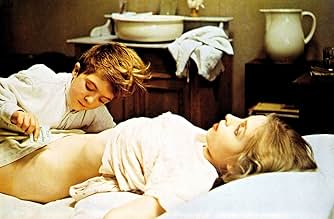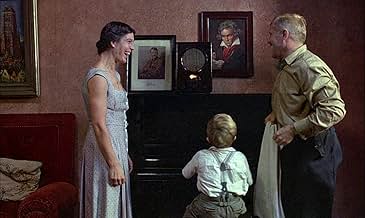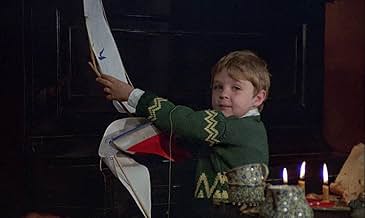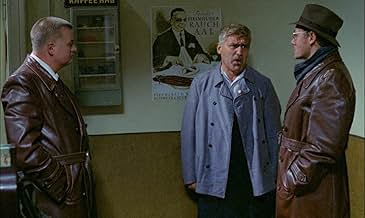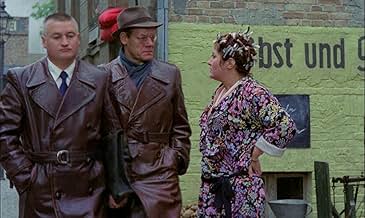En 1924, Oskar Matzerath nace en la ciudad libre de Danzig. A los tres años, se cae por las escaleras y deja de crecer. En 1939, estalla la Segunda Guerra Mundial.En 1924, Oskar Matzerath nace en la ciudad libre de Danzig. A los tres años, se cae por las escaleras y deja de crecer. En 1939, estalla la Segunda Guerra Mundial.En 1924, Oskar Matzerath nace en la ciudad libre de Danzig. A los tres años, se cae por las escaleras y deja de crecer. En 1939, estalla la Segunda Guerra Mundial.
- Dirección
- Guionistas
- Elenco
- Ganó 1 premio Óscar
- 18 premios ganados y 6 nominaciones en total
- Lina Greff
- (as Andréa Ferreol)
- Der Alte Heilandt
- (as Helmuth Brasch)
Opiniones destacadas
The film is filled with moral ethics and symbolism. The tin drum Oscar always drums on is a symbol of his protest against the cruelty that grown ups create, not to mention the rise of Nazism. Die Blechtrommel even has large scenes that are only for symbolism. It is probably one of the most important German films since WW2. Somehow, the German make the best films that decipher Nazism and WW2 (like Stalingrad and the new Der Untergang) which very clearly shows their self awareness. I think Die Blechtrommel is one of the finest examples of this.
It is often quite absurd this film, one of the most memorable scenes is when Oscar watches a Nazi rally. As an officer is marching through the crowd, the orchestra is playing a march. Oscar starts playing his drum, and make all the musicians play false, and after a while they all start to play "An der Schönen blauen Donau" and the crowd starts to dance.
Die Blechtrommel is one of the most memorable films ever, whet ever you liked it or not. Some scenes are very sick, and i do not encourage people who don't have a stomach for strong films to see this. For other film lovers though, this is one of the greatest films ever.
This is very much a fantasy film. IMDb says it is a war drama, which is true enough, being set in the place and time that it is. But this is less about the war and more about Oskar, which I think makes it a fantasy film. His imagination is incredible, or perhaps more incredible is the idea that none of this is his imagination at all. His ability to alter the world around him is quite interesting.
The idea of a tin drum as a symbol of protest makes sense. It becomes even more interesting when put in the hands of a small child, protesting against life itself. Such an action is unheard of.
Goodness, what a marvel this film is! It is certainly the greatest film from Germany that I have seen yet. Winner of the 1979 Academy Award for Best Foreign Language Film, "The Tin Drum" follows the life of a boy named Oskar. After seeing how ludicrous adults act, Oskar decides to stop his growth, and stay three years old forever by falling down the stairs. He succeeds, and the fall has stopped his growth. Aside from the hault of growth, the fall eqips him with two special powers that he regularly manifests. The lesser of these two powers, is repeatedly pounding his tin drum, which he absolutely refuses to let go of. Oskar's undeniable power is to let out a high pitched shriek that will shatter any glass he directs it at. Does it sound strange? Well, the film is much stranger, but also much more beautiful than my description.
The film follows our little Oscar over a period of around two decades, through World War II in Germany. We follow Oskar through his many sexual, emotional, tragic, funny, and beautiful exploits. An absolutely important credit must be given to actor David Bennett, who plays young Oskar. He portrays Oskar as an infant, as a three year-old, as a six year-old, as a twelve year-old, as a 16 year-old, as a 21 year-old...well, you get the picture. Bennett was only 11 at the time, and his performance is very impressive.
I haven't seen very many German films from the last thirty years, but most of the ones I have seen (the excellent "Vanishing," and the immensely mediocre "White Rose") haven't had very good scores. "The Tin Drum" has a very slight, but very servicable, score by the famous Maurice Jarre. The score has an emotional theme played in only a few scenes (notably, the ending), it also has an innocent little music box theme, and surprisingly a cool waltz for scenes involving members of the circus (a big part of the second-half of the film). A very good score. To my knowledge, it was released on LP when the film was released, and on a CD pressed in Japan sometime in the 90's. I read that the (sadly out of print) Kino DVD includes the isolated score as an extra.
It's an excellent film that I strongly connected with, but I can see many people not liking it, it is VERY strange, but I am somebody who has always found VERY strange things extremely beautiful, and "The Tin Drum" is no exception. Over-all, I consider this film a classic, and I'll once again state that it is certainly the greatest film from Germany that I have seen yet.
¿Sabías que…?
- TriviaDavid Bennent has a condition which caused him to grow very slowly. When he appeared in this film at age 11, he was 1.14 meters (3 ft. 9' in.) tall. He continued to grow to 1.55 m (5 ft. 1 in), and was still growing well into his thirties.
- ErroresWhile the German soldiers attack the Polish post office, one fires an MG42 machine gun from his shoulder. The German army didn't use that weapon before 1942. It's also not supposed to be fired while standing.
- Citas
Oskar Matzerath: There once was a drummer. His name was Oskar. He lost his poor mama, who had eat to much fish. There was once a credulous people... who believed in Santa Claus. But Santa Claus was really... the gas man! There was once a toy merchant. His name was Sigismund Markus... and he sold tin drums lacquered red and white. There was once a drummer. His name was Oskar. There was once a toy merchant... whose name was Markus... and he took all the toys in the world away with him.
- Versiones alternativasAlthough reluctant to do so the BBFC were forced to remove 19 secs from UK cinema and video versions under the Protection of Children Act to remove a scene showing Oskar pressing his face against Maria's pubic region. The cuts were waived in 2003 when it was decided that the scene did not constitute an indecent image.
- ConexionesFeatured in Pieces of Silver (1989)
Selecciones populares
Detalles
- Fecha de lanzamiento
- Países de origen
- Sitio oficial
- Idiomas
- También se conoce como
- The Tin Drum
- Locaciones de filmación
- Productoras
- Ver más créditos de la compañía en IMDbPro
Taquilla
- Total a nivel mundial
- USD 7,469
- Tiempo de ejecución2 horas 22 minutos
- Color
Contribuir a esta página



